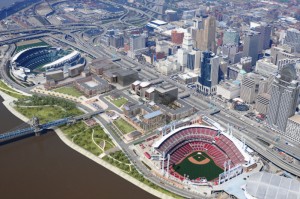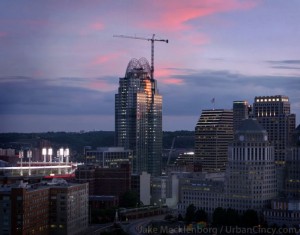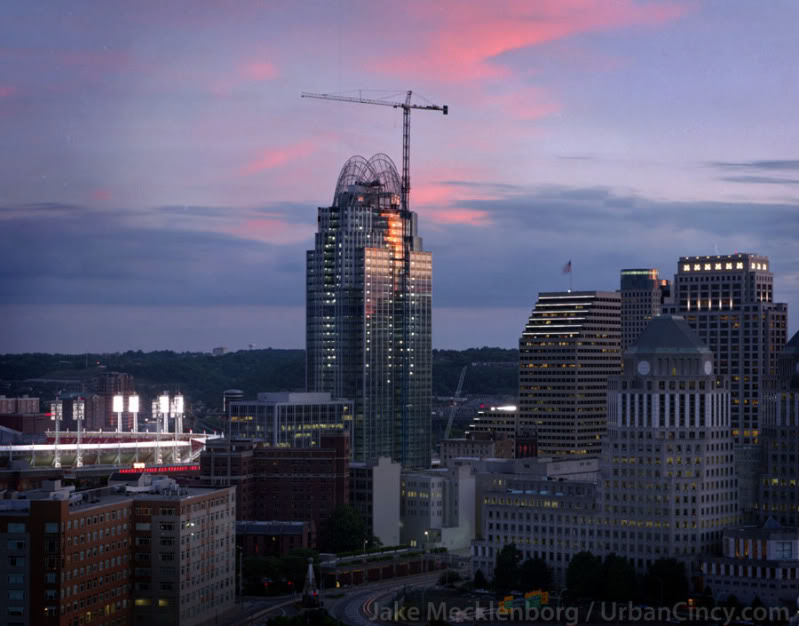 During the month of August, UrbanCincy published several articles laying out a long-term vision for the city. David Cole compared Cincinnati to Chicago, pointing out what we should—and shouldn’t—learn from our neighbor to the northwest. Jake Mecklenborg analyzed the Eastern Corridor rail plan and explained why it might not currently be the best plan for Cincinnati. Randy Simes reported on Cincinnati’s success in completely remaking its riverfront, and criticized Peter Bronson’s piece attacking The Banks and the Cincinnati Streetcar.
During the month of August, UrbanCincy published several articles laying out a long-term vision for the city. David Cole compared Cincinnati to Chicago, pointing out what we should—and shouldn’t—learn from our neighbor to the northwest. Jake Mecklenborg analyzed the Eastern Corridor rail plan and explained why it might not currently be the best plan for Cincinnati. Randy Simes reported on Cincinnati’s success in completely remaking its riverfront, and criticized Peter Bronson’s piece attacking The Banks and the Cincinnati Streetcar.
UrbanCincy’s top 5 articles for the month of August were:
- Unraveling the urban differences of Cincinnati and Chicago
The first and most obvious difference between Cincinnati and Chicago is one of sheer scale. While driving through Indiana on the way to Chicago from Cincinnati, the transition from rural cornfields to suburban sprawl began while I was still a good 40 miles away from the Chicago Loop. Here in Cincinnati, 40 miles in any direction from Fountain Square would be considered far into the hinterland. - Breaking down Cincinnati’s Eastern Corridor passenger rail plan
At first glance it would appear that implementation of commuter rail service on the Oasis Line should require nothing more than the purchase of commuter trains and the construction of a connection between the end of active tracks and the Riverfront Transit Center. Unfortunately, the poor condition of the existing track limits traffic to a maximum twelve miles per hour. - Jean-Robert’s Table to open in downtown Cincinnati August 10th
Unanticipated construction delays, and personal reasons pushed back the original opening of Jean-Robert’s Table for the famed Cincinnati chef. The new restaurant is Jean-Robert de Cavel’s first since parting ways with long-time restaurant partners Martin and Marilyn Wade.  Cincinnati’s dramatic, multi-billion dollar riverfront revitalization nearly complete
Cincinnati’s dramatic, multi-billion dollar riverfront revitalization nearly complete
Several decades ago Cincinnati leaders embarked on a plan to dramatically change the face of the city’s central riverfront. Aging industrial uses and a congested series of highway ramps was to be replaced by two new professional sports venues, six new city blocks of mixed-use development, a new museum, a central riverfront park, and parking garages that would lift the development out of the Ohio River’s 100-year flood plain.- Cincinnati’s old money attacks the future with the promise of a failed past
What was interesting about Bronson’s story is that he took a platform for which he enthusiastically touted the new tower and how it was accomplished, and turned it into an opportunity to lob attacks at other major projects like the Cincinnati Streetcar and The Banks development along the central riverfront. It took Bronson no more than eleven sentences before he dove head-first into his attack of both projects.
